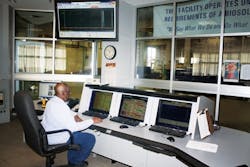About the author: Kelsey Beveridge is technical writer for the Water Environment & Reuse Foundation. Beveridge can be reached at [email protected] or 571.384.2099.
A new partnership between The Water Environment & Reuse Foundation (WE&RF) and the Smart Water Networks Forum (SWAN) will accelerate the smart water solutions that are gaining traction with municipal water utilities.
Driving Data
Many utilities and their consultants see data and analytics as critical tools for overcoming the challenges posed by crumbling water infrastructure. Data-driven components are helping to operate the data-less physical layer of pipes, pumps, reservoirs and valves. Water utilities are gradually deploying more data-enabled components. Yet they require assistance to share the successes, failures and lessons learned as the water sector transitions to more data driven decision-making.
WE&RF conducts research on treating and recovering beneficial materials from wastewater, storm water and seawater. WE&RF’s Intelligent Water Management research portfolio identifies, evaluates and shares the application experience of advanced sensing technologies and networks used for compliance strategies and improved efficiency of collection and treatment operations and sewershed management. The research projects in the portfolio seek to develop and maximize utilities’ capacity to use the vast amount of data generated to support modernization and to improve receiving water quality and ecosystem health. SWAN collects comprehensive data and offers solutions to improve the efficiency, longevity and reliability of the underlying physical water network by quickly adopting water technologies.
The partnership will globally expand the dissemination of both organization’s findings and accelerate the development and deployment of data-driven technologies in North American water and wastewater communities. SWAN has an international membership consisting of leading water utilities, academics, investors and consultants. Sharing WE&RF’s intelligent water management research portfolio with the SWAN membership brings the latest advancements through research directly to new audiences. It will also promote critical discussions and help deploy tools needed to advance the water sector.
SWAN also will contribute data and information to current and future WE&RF Intelligent Water Management projects. For example, this year WE&RF will begin its seventh intelligent water research project titled “Leveraging Other Industries—Big Data Management” to identify how Internet of Things and big data analytics are being used in other industries. The research team will survey SWAN’s international membership of utilities, technology firms, consultants, and universities. Involvement of SWAN members will generate knowledge that can be used to improve operational efficiencies, asset investment decisions and regulatory compliance while reducing impacts on the environment.
Ultimately, through this research portfolio, understanding how to harness big data through the use of real-time analytics and edge processing will provide the water community with a variety of benefits. Utilities will realize cost savings from proper asset management, quick decision-making and transition from reactive to proactive maintenance. Improved operating efficiency resulting from operating assets at peak performance should also result. Capital improvement plans will be enhanced through improved insight on operational performance, which frees scarce resources to be redirected. Communications between departments will expand through open information sharing, so staff can focus on information evaluation and response instead of manual data processing. The emphasis on turning data into information will help utilities increase environmental stewardship by meeting and exceeding environmental regulations. Finally, the partners envision the use of advanced analytics to improve communications between utilities and stakeholders regarding safety, security, and public space.
Leading by Example
A critical component of the partnership’s value derives from WE&RF’s coordination of the Leaders Innovation Forum for Technology (LIFT), a joint initiative with WE&RF and the Water Environment Federation. LIFT brings innovation to real-world applications and facilitates early adoption of technology. The goal of LIFT is to connect technology providers to a variety of stakeholders in the water sector, including municipal and industrial water, wastewater and storm water agencies; technology providers; consultants; investors; federal agencies; non-governmental organizations; academia; and others.
WE&RF will encourage interested SWAN members to submit intelligent water technologies for inclusion in LIFT Technology Scans. The scans offer an optimal platform for providers to introduce their emerging, pre-commercial and newly commercialized technologies to hundreds of water facility owners.
Many SWAN members have new technologies that can benefit the water sector with help and advancement from LIFT. Selected vendors are invited to present their technologies to an audience consisting of more than 350 municipal and industrial facility owners, as well as consulting firms, venture capitalists and end users.
One of LIFT’s focuses is intelligent water systems (IWS), exploring new technologies and management strategies to adapt to the changing water utility environment. Operating under an assumption that the best way to determine whether or not a technology is useful is to speak with like-minded counterparts and hear case studies from the technology providers themselves. WE&RF and SWAN are planning to host joint workshops that highlight new IWS at LIFT events, such as the Intensification and Resource Recovery Forum 2017. LIFT Link, an online platform, can help facility operators identify collaboration opportunities with other organizations and stakeholders to mitigate the cost and risk of participating in technology pilots and demonstrations.
The collaboration between WE&RF and SWAN will broaden the reach of intelligent water research and ultimately benefit the water sector as a whole. Consulting engineers, corporate managers and operators in the municipal and industrial markets will have better knowledge for accelerating adoption of intelligent water management with expanded inclusion of IWS technologies.
